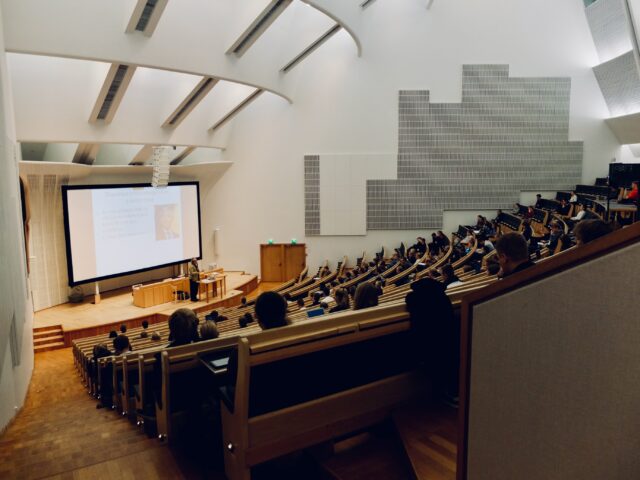A pair of recent editorials published in the Calgary Herald debate higher education’s role in the current health care crisis. Orthopedic surgeon Dr Debakant Jena points to the disconnect between Canada’s critical demand for skilled workers at a time when “many competent Canadian graduates and university students are desperately trying to enter these fields.” Jena asserts that the failure lies with the “restrictive and unnecessarily elitist” postsecondary system. University of Calgary Associate Professor Ronald Glasberg responded in a subsequent editorial, in which he argues that the issues Jena identified are not due to higher ed being “unnecessarily elitist,” but rather due to a lack of public funding – and as a result, a lack of instructors and educational resources – due to “competitive capitalism.” Glasberg encourages stakeholders to find a way to break out of this cyclical situation, such as through the creation of a publicly funded think tank.

Top Ten News
June 12, 2023
Laurentian University has created a list of the assets that it could sell to the Government of Ontario to pay its creditors. The non-binding term sheet identifies 68.75 acres of land, as well as five buildings: The East Residence, Vale Living with Lakes Centre and Watershed Building, the Northern Ontario School of Medicine, the Health Sciences Building, and the Security and Maintenance Building. The buildings would be bought by the province and fully or partially leased back to Laurentian or NOSM University. The term sheet puts the university in the position to explore the sale of the assets with the province and negotiate an agreement by November 2025.
Providence University College has forged an educational agreement with Canadian North Airlines to train Inuit students as pilots who will serve northern communities. Under the agreement, students will complete either a Bachelor of Arts in Aviation or a double major in Aviation and Business Administration, while learning skills that will prepare them to operate in the North. Graduates of the program will receive conditional offers of employment from Canadian North. “We believe we can be part of the solution to Canada’s chronic pilot shortage to enhance the lives of people in the far north,” said Providence President Kent Anderson.
In an open letter co-signed by the leaders of the Université du Québec network, UQuébec President Alexandrew Cloutier calls for a review of the network’s funding. Cloutier writes that while the UQ network is the largest French university network in the Americas and serves nearly a third of the student population in Quebec, the institution’s funding structure limits its ability to fulfill its mission and address issues such as the graduation gap between QC and provinces like Ontario. Anne-Marie Provost spoke to Cloutier about the open letter, and Cloutier shared that the additional funding could go toward improving student supports, faculty supervision rates, administrative supports, and more. Cloutier stated that the network is not interested in increasing tuition to address the funding gap.
Minister of Immigration, Refugees and Citizenship of Canada Sean Fraser has reportedly promised that the group of Indian students who were found to have used fraudulent college admission letters from an education consultant in India to gain admittance to Canada will have a “fair outcome.” Fraser said in a tweet that “[w]e are actively pursuing a solution for [international] students who are facing uncertainty due to having been admitted to Canada with fraudulent college admission letters.” While Fraser did not clarify if deportation orders would be put on hold while the cases are resolved, he noted that there would be consequences for those who had “taken advantage” of international students. CBC reports that a group of international students have been protesting the deportation plans outside of a Canadian Border Service Agency in Mississauga for over a week.
Mohawk College has launched an Esports Administration diploma program. The program will prepare students for the esports world with training in team and event management, marketing and sponsorship, broadcasting and production, game development, and player management. Mohawk has also established the Mohawk Esports Community Arena (MECA), which will host events. “Students will gain a deep understanding of the strategic, operational, and managerial aspects of esports, preparing them for exciting career opportunities in this dynamic industry,” said Mohawk VP, Academic Dr Cebert Adamson.
North Island College has postponed its Port Alberni Graduation due to the wildfire at Cameron Bluffs and road closures. The graduation was originally scheduled for Tuesday, but the college has postponed the event to the fall due to the closure of the highway connecting Port Alberni and West Coast communities to Qualicum and the Island’s east side. “While we want to honour your journey, we are unable to fully celebrate at this time,” read the release. “We hope to celebrate again when community resources are not hampered by the road closures, and community members are able to fully celebrate with us.”
Ten educational institutions in the Mauricie and Centre-du-Québec regions have formed a consortium to support the newly formalized Vallée de la transition énergétique innovation zone. The Consortium Formation-Énergie MCQ is comprised of the Université du Québec à Trois-Rivières, Cégep de Shawinigan, Cégep de Trois-Rivières, Cégep de Victoriaville, Cégep de Drummondville, and five local school centres. Beginning in 2024, the consortium will offer for-credit and non-credit training in topics related to the energy transition. Ville de Bécancour Mayor Lucie Allard noted that the collaboration will see a training centre established in Bécancour. This is the second consortium to form in support of the Vallée de la transition énergétique.
In a recent interview with The EvoLLLution, Jamie Carmichael (Carleton University) and Sarah Eaton (University of Calgary) discuss the prevalence of fake degrees and credential fraud in higher education and how postsecondary leadership can raise awareness of the issue. Many leaders may be unaware of the prevalence and various types of credential fraud that can occur in the sector, they explain. The interviewees discuss a variety of factors that can influence fraud, such as technology, flaws within standardized testing, and equity and fairness. Eaton notes that transparency, training, and having academic fraud practices and policies in place are vital to ensuring employees are prepared to navigate potential cases of fraud. Carmichael also encouraged hiring professionals to verify academic credentials when hiring.
AGE-WELL and ONCAT have each recently announced investments in research projects at Canadian postsecondary institutions. AGE-WELL has collaborated with the Canadian Frailty Network (CFN) to fund 17 research projects through the inaugural Catalyst Funding Program in Healthy Aging. The projects will focus on technology-enabled solutions that will drive forward Healthy Aging Canada. The over $800K in funding will be distributed to 17 research projects being conducted by researchers and trainees that hail from 18 Canadian universities and research centres. ONCAT has awarded $560K to eight postsecondary institutions, which will use the funding to develop programs and supports for students impacted by the pandemic. Institutions receiving the funding include Cambrian College, College La Cité, George Brown College, Georgian College, Humber College, Lakehead University, Niagara College, and York University.
